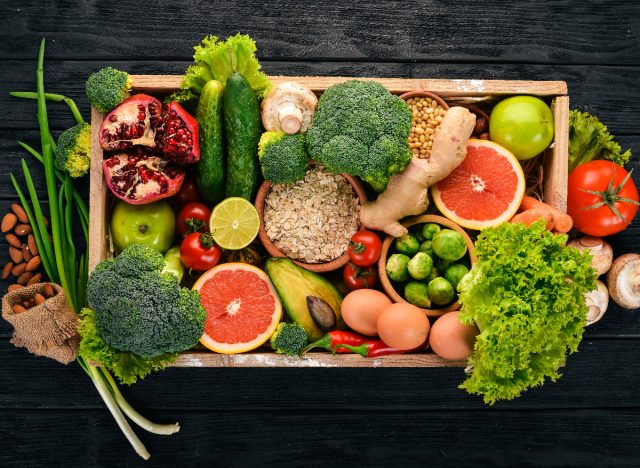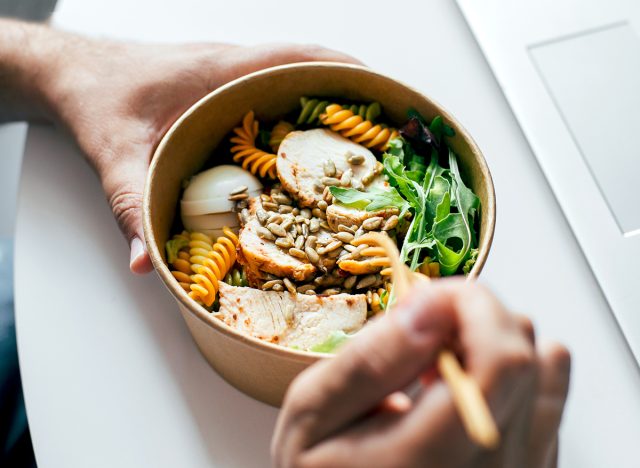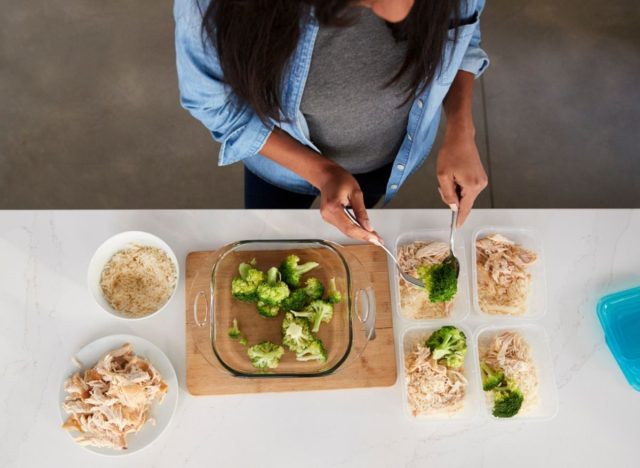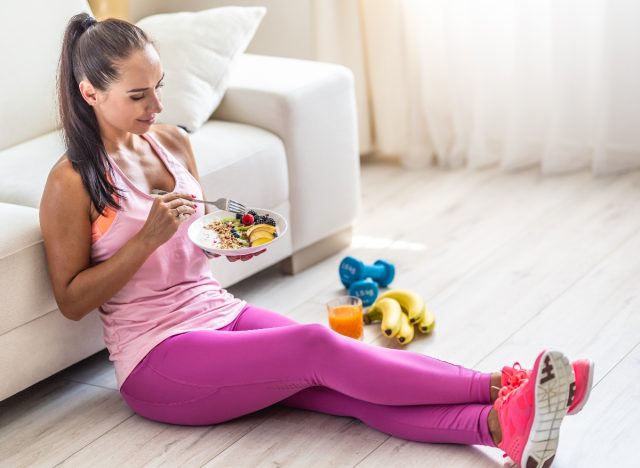Losing weight is no easy feat, and it can require more time and intention after 30. Although studies show that your metabolism doesn’t significantly start to slow until you reach the age of 60, there are many reasons why it may seem like you’re more likely to gain weight once you hit 30: your life gets busier, work gets in the way, you become more sedentary, your eating habits may suffer, and more. “If you have never struggled with weight before 30 and your eating and lifestyle habits are less than desirable, chances are it will catch up with you at some point,” Laura Burak MS, RD, founder of GetNaked® Nutrition and author of Slim Down with Smoothies tells Eat This, Not That!.
The good news is that Burak says she doesn’t believe that age will work against your efforts to achieve a leaner, healthier you. With the right positive mindset and healthy game plan you know you’ll stick with, you’ll be headed in the right direction when it comes to weight loss after 30.
Although diet plays a large and very important role in weight loss—which we’ll get to shortly—be mindful that there are other key players that are just as crucial to melting off unwanted pounds. These include movement, getting proper hydration, managing your stress, and getting good quality sleep. “I see clients that are ‘doing everything right’ when it comes to eating, but they haven’t addressed these other crucial areas of their life that can have a major impact,” Burak says.
Diet and exercise go hand-in-hand. According to the U.S. Department of Health and Human Services, you should get in a minimum of 150 minutes of moderately intense aerobic exercise or 75 minutes of vigorously intense aerobic physical activity per week. Strength training is also important and should be performed a minimum of twice a week. This healthy combination can aid in your weight loss efforts while helping you maintain lean muscle and strength.
That being said, let’s move on to the healthy eating part of the equation. Burak outlines some of the best eating habits for rapid weight loss after 30. Keep reading to learn all about them, and next up, don’t miss the 10 Tips To Lose 5 Pounds Quickly.

First and foremost, Burak recommends establishing a foundation of mainly quality plant foods. This consists of foods that grow outdoors, such as fresh veggies and fruits, seeds, nuts, heart-healthy oils such as avocado and olive, potatoes, corn, lentils, and beans. One 2020 review published in the journal Nutrients found that increasing fruit and vegetable intake was found to support weight loss in women, likely due to the fact that these foods are high in dietary fiber, are low in calories, and can help you eat more slowly.
You should also eat lots of lean protein like fish, eggs, and poultry in order to stabilize your blood sugar. “[This] will in turn keep you balanced and satiated and less likely to eat all the junky processed food at 4 pm,” Burak explains.

Added sugar is not your friend—especially when you’re trying to lose weight. “One of the biggest challenges we face is the abundance of added sugar in our diets, and as you get older, it can have more of an impact on your health and weight,” Burak explains. Consuming excess calories from added sugars has been linked to weight gain and an increase in belly fat.
It’s a smart habit to limit the amount of added sugar you consume. (Pastries, baked goods, soda, and candy, we’re looking at you!) In addition, start reading food labels whenever you’re shopping at the grocery store. This can help you identify sneaky sources that are hiding in many packaged foods.

When trying to achieve rapid weight loss, don’t make the mistake of not eating enough during the day and then reaching for the cookie jar at night. Your body needs fuel throughout the day, so depriving yourself of calories all day long and then consuming more than you should late at night can result in weight gain and other health issues.
Burak stresses, “Eat enough food during the daytime hours when you actually need it the most, and lighten up the evening meal. With the trend of intermittent fasting and/or just being ‘too busy’ to stop and eat or reporting to ‘not be as hungry’ during the day, people are skipping meals and skimping on having enough food in general which then always tends to backfire into a free-for-all of sugary or snack foods in the afternoon and into the evening.”

If you want to achieve weight loss after 30, consider meal-prepping your food on a Sunday to ensure you’re providing your body with all the necessary nutrients and have a handle on portion sizes. With all of your meals mapped out for the week, you likely won’t feel the need to pick up something unhealthy on the way to work or on your way home. Plus, according to research published in the International Journal of Behavioral Nutrition and Physical Activity, preparing meals at home is linked to an all-around “improved diet quality.” In female participants, meal planning was directly correlated to a decreased likelihood of being obese and overweight; in the male participants, planning out meals played a significant role in decreasing obesity.

It may sound simple, but sitting down and slowing down in your hectic schedule to enjoy your food can make a major difference in supporting weight loss after 30. Limit any distractions like scrolling through social media, and practice mindful eating. “Pay attention to the fact that you’re actually eating so your mind and body can process food better and prevent you from eating too much later when you most likely don’t need that energy at the end of the day,” Burak explains.
Alexa Mellardo

